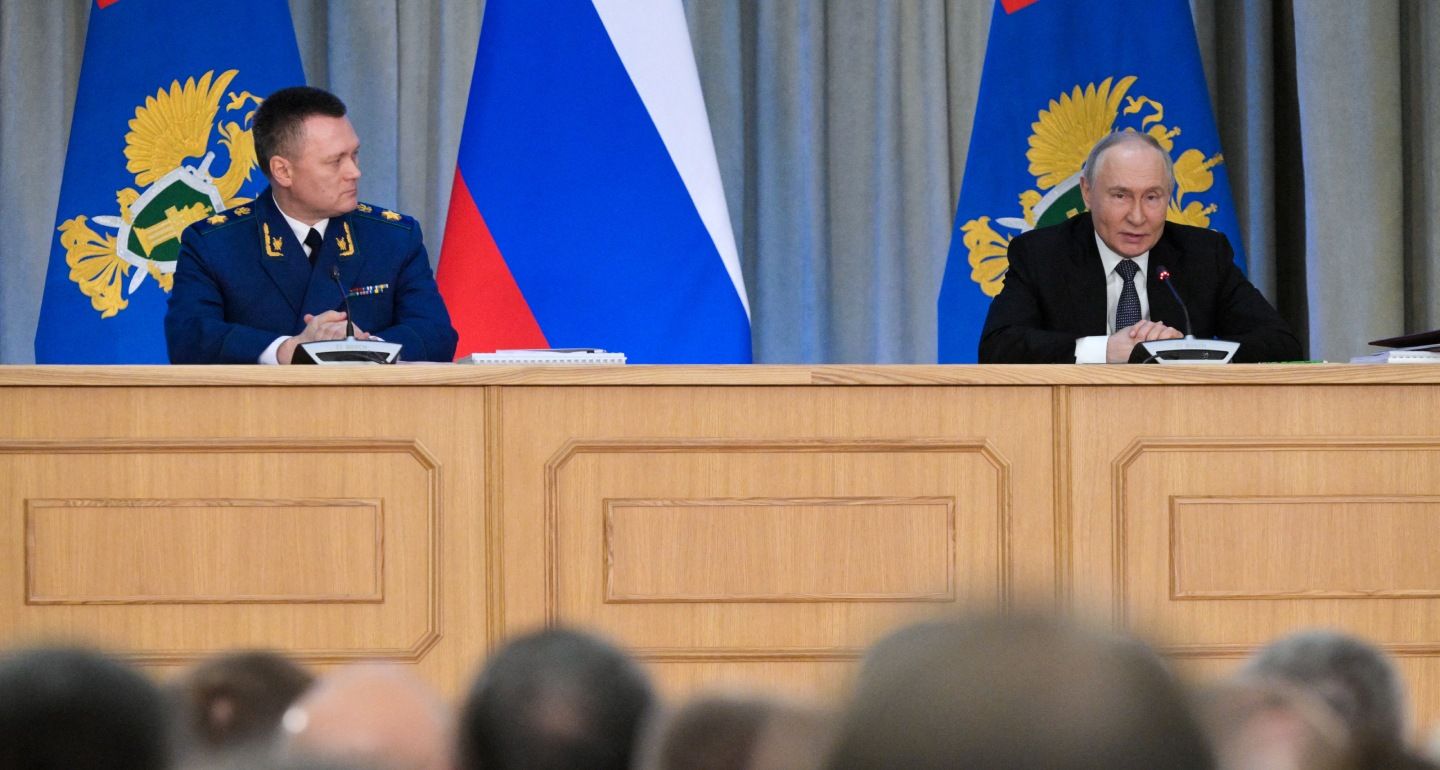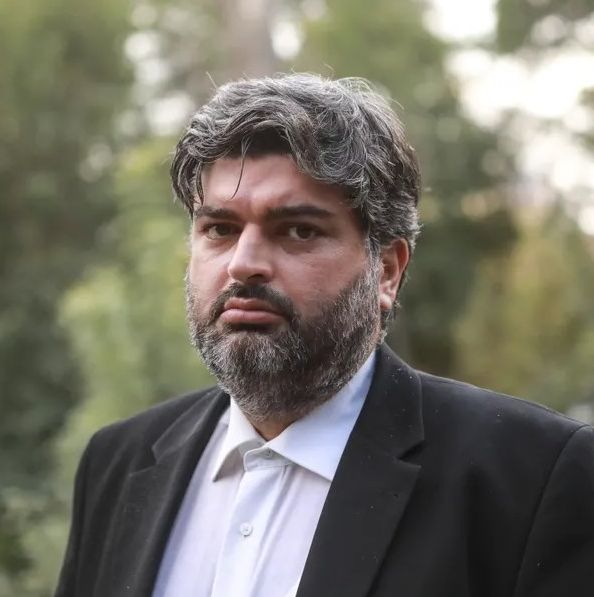Having failed to build a team that he can fully trust or establish strong state institutions, Mirziyoyev has become reliant on his family.
Galiya Ibragimova
{
"authors": [
"Mikhail Komin"
],
"type": "commentary",
"blog": "Carnegie Politika",
"centerAffiliationAll": "",
"centers": [
"Carnegie Endowment for International Peace",
"Carnegie Russia Eurasia Center"
],
"englishNewsletterAll": "",
"nonEnglishNewsletterAll": "",
"primaryCenter": "Carnegie Russia Eurasia Center",
"programAffiliation": "",
"programs": [],
"projects": [],
"regions": [
"Russia"
],
"topics": [
"Domestic Politics",
"Political Reform"
]
}
Source: Getty
It seems that Putin decided not to reward Prosecutor General Krasnov for the trillions of rubles he had expropriated for the budget. Instead, he chose to curb Krasnov’s enthusiasm and protect the system from a young wolf who had gotten above his station, and his comrades in the FSB.
On September 24, Igor Krasnov, who had been prosecutor general, was officially appointed head of Russia’s Supreme Court, and replaced by Alexander Gutsan, an inconspicuous bureaucrat. Krasnov’s recent actions as prosecutor general suggest that this is an attempt by the Kremlin to curtail the ambitions of the security forces, which have gotten out of hand during the war with Ukraine.
On September 22—just two days before leaving his post—Krasnov unexpectedly filed charges against the State University of Trade Unions (one of Russia’s few private universities) and its controversial longtime rector, Alexander Zapesotsky, over the unlawful appropriation of state property.
Zapesotsky is a prominent representative of the old-school St. Petersburg establishment. He is also a confidant of President Vladimir Putin, which has enabled Zapesotsky to get away with behaving eccentrically in public and conducting some highly dubious experiments in education.
After a court had already ordered the seizure of university assets and Zapesotsky had been suspended, in what were literally the final hours of Krasnov’s tenure, the Prosecutor General’s Office accused Zapesotsky of plotting to organize student protests in his defense and requested an expedited review of the case against him. The rector hotfooted it to Moscow in search of protection, but there’s no guarantee he will be able to stop the prosecution.
A similar fate befell Viktor Momotov, chairman of the Council of Judges of Russia. On September 23, the Prosecutor General’s Office accused him of illegal business activities and of having ties to an organized crime gang.
Although the Council of Judges’ formal powers are fairly modest, the chairman of this judicial self-governance body is officially the second most senior person in the hierarchy of Russian general jurisdiction courts. The only person above him is the head of the Supreme Court—which is now none other than Krasnov.
Krasnov’s recent attacks on the representatives of the Russian ruling elite are another confirmation of how much his influence has grown in recent years thanks to the Prosecutor General’s Office’s active involvement in the mass renationalization of assets following Russia’s invasion of Ukraine. According to both independent investigations and estimates from the Prosecutor General’s Office itself, several trillion rubles (dozens of billions of U.S. dollars) have been seized over the last three and a half years, and the pace of expropriation is increasing all the time.
The idea of nationalizing the assets of Russian businesses and officials, retroactively declaring some of their actions illegal, did not come from Krasnov. His contribution was to vastly expand the grounds on which property can be seized.
Previously, the Prosecutor General’s Office was considered the weakest agency among the big four security agencies (the other three being the FSB, the Investigative Committee, and the Interior Ministry). After the Investigative Committee separated from the Prosecutor General’s Office in 2011, prosecutors lost the ability (with rare exceptions) to independently initiate cases.
The main official task of the Prosecutor General’s Office, as darkly comic as it may now sound, is upholding human rights and the rule of law. Krasnov, who previously worked at the Investigative Committee, came up with a way to transform “upholding the rule of law” into a legitimate power tool for influencing the redistribution of revenue streams.
In practice, this meant the Prosecutor General’s Office launching lawsuits challenging the legality of transactions involving businessmen, officials, and other members of the Russian elite. Zapesotsky and Momotov were merely the latest to find themselves facing what about five hundred other organizations have since 2022.
Krasnov’s new weapon had two key advantages. First, when explaining why the deals in question were unlawful, the Prosecutor General’s Office combined the current political “offenses” of those whose assets were seized—support for the late opposition leader Alexei Navalny’s Anti-Corruption Foundation, sympathy for Ukraine, or holding a residence permit in an unfriendly Western country—with more traditional charges such as embezzlement, misappropriation, and violations of privatization rules.
The combination of these two aspects ensured a gradual and constant expansion of pretexts for bringing legal action. Over time, the criteria for filing such claims became so fluid that it was completely unclear who would be punished next and for what.
The second advantage of Krasnov’s weapon was the de facto absence of a statute of limitations for such lawsuits. This uncertainty was so alarming for major Russian businesses that they deployed all of their meager political resources to try to establish some deadlines. To some extent, they succeeded, and Putin tasked the government with drawing up corresponding legislative amendments back in the summer.
On September 25—the day after Krasnov stepped down as prosecutor general—a meeting of the Presidential Council for the Codification of Civil Legislation was scheduled to adopt those amendments, setting the statute of limitations for privatization transactions at ten years. However, on the same day that the Prosecutor General’s Office filed the lawsuit against Momotov, it emerged that the statute of limitations issue had been removed from the Council’s agenda. The president’s earlier order was not rescinded, but it is no longer clear how it will be implemented.
In an interview in early September, Krasnov was unable to explain his impending job change and sounded quite irate. That is understandable: although, formally, head of the Supreme Court is a more important role, it comes with virtually no real authority or access to resources. Courts in Russia have long been subordinate, simply initialing the decisions of the security forces.
Krasnov’s flurry of activity in his last two days as prosecutor general and his apparent irritation at his transfer both point to the fact that the decision was not one that was planned far in advance. Indeed, when the post of head of the Supreme Court became vacant upon the death of Irina Podnosova in July, it was Alexander Bastrykin, the longtime head of the Investigative Committee, who was initially tipped to take her place.
Having become something of a comical figure as a result of his outlandish comments, Bastrykin was expected to be gracefully retired to the Supreme Court. He could have been replaced by Krasnov, whose zeal had surely earned him a promotion. Gutsan, who had returned from political oblivion as a presidential envoy, would be made prosecutor general with the brief of curtailing the ambitions of that office back to the more modest levels seen under Krasnov’s predecessor, Yury Chaika. But for various reasons, Krasnov ended up losing out.
It’s telling that Krasnov’s transfer occurred at the same time as that of Ivan Tkachev, an influential FSB functionary believed to have close ties to him. Like Krasnov, Tkachev was appointed to what is technically a more prestigious post—head of the FSB’s Department of Military Counterintelligence—from a more influential position as head of Directorate K, which oversees banks and customs.
According to RBC media outlet and other publications, Krasnov and Tkachev are connected through their wives. And in at least several recent nationalization lawsuits, independent investigators discovered that FSB materials had been transferred to the Prosecutor General’s Office, which, given the competition between law enforcement agencies, is not exactly common practice.
It seems that the president decided at the last minute not to reward Krasnov for the trillions of rubles he had added to the budget. Instead, he chose to curb Krasnov’s enthusiasm and protect the system from a young wolf who had gotten above his station, and his comrades in the FSB.
The prosecutor general’s active role in the redistribution of rent flows had created unnecessary anxiety among some of the elite, and—most importantly—gave Krasnov a way to build personal relationships with the Russian establishment in the future. After all, with the grounds for the Prosecutor General’s Office’s lawsuits becoming more and more tenuous and defense against them increasingly difficult, why not negotiate with that power center rather than hope for an emergency audience in the Kremlin? Although Krasnov was previously considered equidistant from all major influence groups, the latest investigations have revealed that members of his family are on the payroll of various oligarchs.
Judging by the case against Momotov, the new head of the Supreme Court will now focus his energy on purges within the judicial corps. It’s entirely possible that Putin has given Krasnov a broad mandate in his new post as a consolation prize. After all, repression against judges is unlikely to help the former prosecutor general increase his personal influence, and will only strengthen the political regime.
Carnegie does not take institutional positions on public policy issues; the views represented herein are those of the author(s) and do not necessarily reflect the views of Carnegie, its staff, or its trustees.
Having failed to build a team that he can fully trust or establish strong state institutions, Mirziyoyev has become reliant on his family.

Galiya Ibragimova
Insisting on Zelensky’s resignation is not just a personal vendetta, but a clear signal that the Kremlin would like to send to all its neighbors: even if you manage to put up some resistance, you will ultimately pay the price—including on a personal level.

Vladislav Gorin
For Putin, upgrading Russia’s nuclear forces was a secondary goal. The main aim was to gain an advantage over the West, including by strengthening the nuclear threat on all fronts. That made growth in missile arsenals and a new arms race inevitable.

Maxim Starchak
For a real example of political forces engaged in the militarization of society, the Russian leadership might consider looking closer to home.

James D.J. Brown
Instead of a guaranteed ally, the Kremlin now perceives Armenia as yet another hybrid battlefield where it is fighting the West.

Mikayel Zolyan